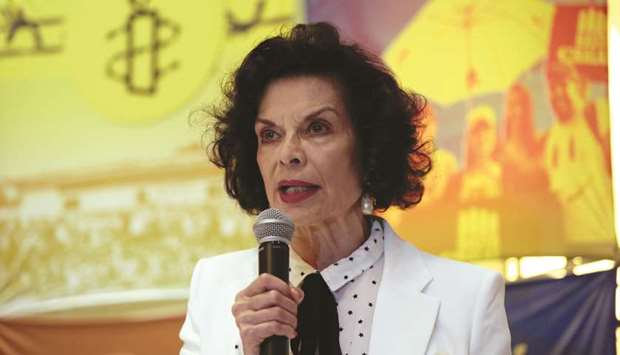Nicaraguan rights activist and actor Bianca Jagger accused President Daniel Ortega of waging a “dirty war” against his own people Tuesday in unrest that has killed at least 87 people.
Jagger was visiting Managua to publicise the launch of an Amnesty International report which said the government was using paramilitary mobs to suppress opposition protests.
Jagger, who witnessed an attack on university students on Monday, said government security forces “that are prepared for war” were killing young people “like dogs.”
“What we have here is a dirty war” against students and an unarmed civilian population, Jagger told a news conference.
“Here we do not have a Sandinista revolution, we have a civic demand” for justice and democracy.
At least 87 people have been killed and almost 900 wounded since protests began on April 18 against Ortega and his party, the Sandinista National Liberation Front (FSLN). The government and opposition agreed overnight Monday to resume Church-mediated peace talks that stalled amid fresh violence last week.
The Amnesty report, entitled ‘Shoot to Kill: Nicaragua’s Strategy to Repress Protest’, said the armed mobs were often made up of pro-government students and motor bikers, sometimes identifiable by clothing linking them to the authorities.
“These pro-government armed groups were apparently used by the government to generate disorder, make threats and carry out attacks, including some that may have proved fatal,” said the report.
Jagger told the news conference that young people protesting in the streets and universities “are willing to die so that we have free elections.”
“The time has come for us to ask for an obtain justice...today I say that the only solution that exists for Nicaragua is for Daniel Ortega and Rosario Murillo to leave” and allow free elections to be held.
Jagger was visiting the rector of Managua’s University of Engineering on Monday when student protesters there came under attack from security forces.
“We heard mortars, bullets and then saw member of the population who came to help students on motorcycles,” she told reporters.
Amnesty’s Americas director Erika Guevara-Rosas told AFP that while repression had become the “common denominator” of the government’s response to protests, “we had never documented such a violent and radicalised situation, with groups that are clearly in collusion with the state authorities.”
“Sadly, we see a perverse parallel in that a president who in the 1980s fought against the dictatorship of (Anastasio) Somoza — which also used repressive measures that cost many lives — is now a political leader using a systematic policy of violence against a citizenry that opposes him,” she said.
The Amnesty report said that on the very first day of protests, security camera footage appeared to show riot police bringing in two truckloads of rocks and distributing them to pro-government groups to hurl at demonstrators.
The protests that broke out in April were initially triggered by now-aborted reforms to the near-bankrupt social security system, but the unrest quickly broadened into a rejection by many Nicaraguans of Ortega and his wife and vice-president, Rosario Murillo, who are seen as autocratic.
Ortega, a former guerrilla who first ruled between 1979 and 1990 before returning as president 11 years ago, has kept power by maintaining leftist rhetoric while ensuring an accommodation with powerful private industry and keeping up trade with the United States.

Human rights activist Bianca Jagger speaks during a news conference with Amnesty International executives about the launch of the documents for multiple cases of violence and repression during recent protests against Nicaragua’s President Daniel Ortega’s government in Managua on Tuesday.
